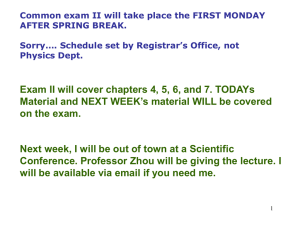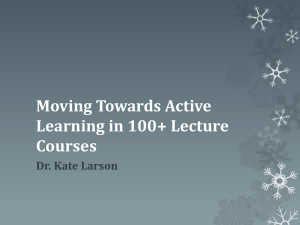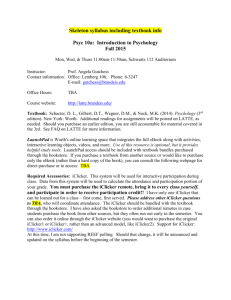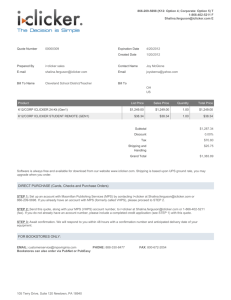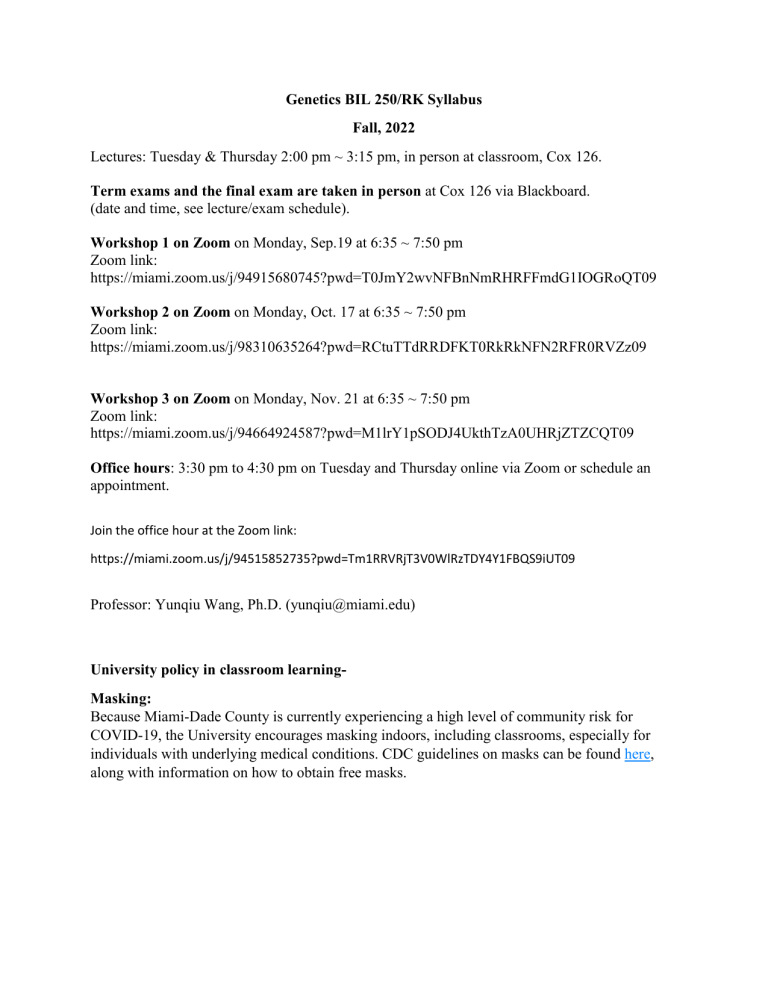
Genetics BIL 250/RK Syllabus Fall, 2022 Lectures: Tuesday & Thursday 2:00 pm ~ 3:15 pm, in person at classroom, Cox 126. Term exams and the final exam are taken in person at Cox 126 via Blackboard. (date and time, see lecture/exam schedule). Workshop 1 on Zoom on Monday, Sep.19 at 6:35 ~ 7:50 pm Zoom link: https://miami.zoom.us/j/94915680745?pwd=T0JmY2wvNFBnNmRHRFFmdG1IOGRoQT09 Workshop 2 on Zoom on Monday, Oct. 17 at 6:35 ~ 7:50 pm Zoom link: https://miami.zoom.us/j/98310635264?pwd=RCtuTTdRRDFKT0RkRkNFN2RFR0RVZz09 Workshop 3 on Zoom on Monday, Nov. 21 at 6:35 ~ 7:50 pm Zoom link: https://miami.zoom.us/j/94664924587?pwd=M1lrY1pSODJ4UkthTzA0UHRjZTZCQT09 Office hours: 3:30 pm to 4:30 pm on Tuesday and Thursday online via Zoom or schedule an appointment. Join the office hour at the Zoom link: https://miami.zoom.us/j/94515852735?pwd=Tm1RRVRjT3V0WlRzTDY4Y1FBQS9iUT09 Professor: Yunqiu Wang, Ph.D. (yunqiu@miami.edu) University policy in classroom learningMasking: Because Miami-Dade County is currently experiencing a high level of community risk for COVID-19, the University encourages masking indoors, including classrooms, especially for individuals with underlying medical conditions. CDC guidelines on masks can be found here, along with information on how to obtain free masks. Course Description: An introductory course in genetics covering classical Mendelian genetics, gene function and regulation, gene editing, gene editing techniques and applications, and aspects of cancer genetics and developmental genetics. Recent studies in the genetic basis of human diseases are discussed throughout the course. Prerequisite: BIL 150, 151 and BIL 160, 161 (or equivalent), minimum grade of C­. Assessment of your performance: Five online quizzes, three term exams and the final exam will be given in person at Cox 126 with Respondus Lockdown Browser and Respondus Monitor on Blackboard. Quiz and exam schedule can be found in the lecture/exam schedule. You can download and install the Official University of Miami version of Respondus Lockdown Browser to your computer following the instruction in this video: https://www.youtube.com/watch?v=RANyaZh55M&list=PLAIQDmZlmm0Xdyj5WTI3z86KBULJ0UiRY&index=1 You can follow the instruction in this video to learn how to use Respondus Monitor during exams. https://www.youtube.com/watch?v=1QVFzMGDzsI&feature=youtu.be Required Course Material: 1. Textbook: “Introduction to Genetic Analysis” 12e by Griffith et al. published by W.H. Freeman and Company, a Macmillan Education Imprint. www.macmillanhighered.com 2. On-line learning package: “Achieve” for “Introduction to Genetic Analysis” 12e. “Achieve” combines an interactive e-book (our textbook) with high-quality multimedia content and ready-made assessment options, including the adaptive quizzing resource, to engage students and develop their understanding. Students are required to complete 17 adaptive quizzes from 17 chapters in this course. Every assignment has a target score point. To complete the assignment, you need to reach the target point. The completion of the 17 assignments contributes 15% of the overall final grade. The adaptive quizzes are useful pre class exercises. It is strongly recommended to take the adaptive quiz for each chapter before the class when the chapter content is going to be lectured in the class. You can find the lecture schedule for each chapter in the following “Tentative Lecture/Exam Schedule in fall 2021”. To earn 15% of the overall final grade from the adaptive quizzes, you need to complete all adaptive quizzes before the due date. The link to adaptive quizzes is available on our course site in the folder “Adaptive quiz” on Blackboard. You can find the access information to “Achieve” on the course site on Blackboard by selecting “Achieve Access”. Please follow the steps in the link to connect with Achieve and get started: Note: The Achieve package includes the eText book “Introduction to Genetics Analysis” 12e for six months. By registering and purchasing “Achieve + iClicker student”, students will be automatically connected to iClicker. 3. On-line learning platform: “iClicker Cloud Classroom Polling System” for “Introduction to Genetic Analysis, 12e.” I will be using the iClicker Cloud classroom polling system in order to make our class time more engaging. This will help me understand what you know, give everyone a chance to participate, and increase how much you learn when we are in class together. This will also provide you with feedback on how well you are comprehending course concepts, help you master challenging concept, and allow you to review material after class. Participating in my iClicker Cloud sessions will be counted towards your final grade as extra credit points. Approximately three questions will be asked in a lecture period. Regardless whether your answer to the iClicker question is correct or not, as long as you participate in the iClicker cloud polling session with your iClicker device, you will earn the iClicker participation points from the polling session. Your final iClicker grade will be calculated as (participation points earned)/(total possible participation points for the class) x 100. Students who achieve 80% of all points possible will earn 5 extra credit points, which will be added to the final exam grade. Students may not make up iClicker exercise points, regardless of the reason (e.g., absence, malfunctioning devices, forgot to register, etc.). It is the student’s responsibility to regularly check (i.e., daily or weekly) their iClicker Reef account to ensure that their submissions were correctly received, and to contact iClicker support to resolve any issues with submissions not being properly recorded in the iClicker in a timely manner. Once you register and purchase access to Achieve, you can have access to iClicker. To connect to iClicker, you can click on the following link: https://macmillan.force.com/macmillanlearning/s/article/Achieve-Connect-your-iClickerstudent-account Once you get yourself connected to iClicker, you can find and add the genetics class to your iClicker to join the in-class exercises. You are required to bring a device to participate in my iClicker Cloud sessions during class. I will be allowing participation with the iClicker Reef app on a smartphone, tablet or laptop. It is your responsibility to set up your iClicker Reef account in a timely fashion and follow the steps below to properly register in my iClicker course. It is also your responsibility to regularly check your iClicker records for any discrepancies and bring them to my attention within 48 hours. Add my iClicker Cloud course to your iClicker Reef account! ● ● ● ● Use the + sign to search for my course in iClicker Reef. In the “Find Your Institution” field, enter [University of Miami] In the “Find Your Course” field, enter [Genetics 2022f] Ensure you select this course: ○ [Genetics 2022f] ○ [Dr. Yunqiu Wang] ○ [Tuesday & Thursday, 2:00 pm] ○ [BIL250RK, 2022] ● Click “Add This Course” and it will be added to the main screen of your iClicker Reef account Now the fun part! Participate in my sessions during each class. ● Each time our class meets, make sure you have selected my course from the main screen of your iClicker Reef account. ○ When I start a session, click the Join button that appears on your screen, then answer each question I ask in iClicker Reef. ○ For short answer and numeric questions, make sure you press Send. Keep track of your attendance, review your work, and study after class in iClicker Reef. ● You can review your attendance record in iClicker Reef, making it easy for you to manage your course attendance. ● You can review your participation in iClicker Reef ● You can use the questions I asked during class as flashcards or practice tests in the Study Tools section of iClicker Reef. Course Learning Goals: 1. To provide you with the core principles of genetics. The lecture and the book will provide the basic content. We will take a historical approach at times to see how famous experiments were performed. We will examine the basic "rules" of genetics that may then be altered to account for more complex situations. After this class, you will be prepared to do research in a lab on campus and to build upon this content with BIL 250 and upper level genetics courses. Below is the amended Bloom's learning pyramid developed as a method of classifying educational goals for students. You should think about this as you study for exams and ask yourself, am I using the right kinds of learning strategies? 2. To gain higher level thinking skills. Following the "Bloom's Taxonomy" learning pyramid, you should start with good study habits at remembering important facts and principles. We are looking for you to apply and analyze. You are UM students; we KNOW you can memorize! You need to move beyond this level of thinking. How can we achieve this? We will have in-class questions to practice this and you will have homework problems to practice on your own. We will also explore classic experiments as a way of thinking through the logic of experiments and to see where the foundations of this content come from. While these may be new ways of thinking for you, practice is the most important way to gain these skill s. FYI: UM medical school sees this is an excellent pre-req course for medical school because it teaches students to think. A sample question testing lower-level thinking skill (Remembering): Ecologists are sampling mice from different parks in New York City. Most of the mice these researchers collect demonstrate “straight” tails; however, few mice exhibit “curly” tails. In this scenario, a “straight” tail would be considered the _________ phenotype, and a “curly” tail would be considered a __________ phenotype. A) heterogametic; homogametic B) polymorphism; wild-type C) mutant; wild-type D) wild-type; mutant E) All of these are correct. A sample question testing higher-level thinking skill (Evaluating): A rare, curly winged mutant of Drosophila was found in nature. A mating of this fly with a truebreeding, normal laboratory stock produced progeny in the ratio 1 curly winged to 1 normal (both sexes had the same ratio). All curly winged progeny of this cross, mated with normal progeny of the same cross, again yielded 1 curly winged to 1 normal fly. When the curly winged progeny of the first cross mated with each other, they yielded a progeny of 623 curly:323 normal. This ratio strongly suggests which of the following? A) Curly and normal are in the 3:1 ratio expected from intercrossing monohybrid genotypes for a recessive mutant allele (curly). B) Curly and normal are in the 3:1 ratio expected from intercrossing monohybrid genotypes for a dominant mutant allele (curly). C) The curly winged parent of the curly curly cross is homozygous. D) Flies homozygous for the curly allele are lethal and never survive. E) The gene for curly is sex-linked. 3. This course should excite you about basic science and its applications. A foundation in genetic crosses with model organisms (basic science tool) allows you to understand human genetic diseases. A foundation in making recombinant DNA constructs (basic science tool) allows you to understand how plants are modified to be herbicide resistant or how recombinant proteins can be turned into medicines. Genetics and molecular biology provide the "tools" that other disciplines call upon in biological research. Plant biologists, evolutionary biologists, clinical researchers etc. all use these tools. Student Learning Outcomes: By the conclusion of this course, students will have the opportunity to: Describe how individual genes are identified, and extract information about genes, alleles, and gene function by analyzing the progeny from genetic crosses. Describe the chromosomal basis of principles of gene inheritance. Describe the phenomenon of gene linkage and contrast genetic and physical mapping strategies. Describe and apply Mendel’s principles to human inheritance. Interpret results from molecular analyses to determine the inheritance pattern, gene interaction, and identities of human genes that can mutate to cause disease. Describe the molecular nature and functions of genes and genomes. Compare different types of mutations and describe how each can affect genes and the corresponding mRNAs and proteins. Apply the results of molecular genetic studies in model organisms to understanding aspects of human genetics and genetic diseases. Describe the processes that can affect the frequency of phenotypes in a population over time. Tentative Lecture/Exam Schedule for Fall 2022 Lecture # 1. 2. LECTURE DATE Aug. Tue. 23 Thur. 25 *TEXTBOOK CHAPTER 1 2 LECTURE TOPIC Course introduction Single gene inheritance 3. 4. Tue. 30 Sep. Thur. 1 2 3 Sex Linkage Independent Assortment – 1 5. 6. Mon. 5 Tue. 6 Thur. 8 Labor Day 3 4 No class. Independent Assortment – 2 Linkage and Recombination - 1 Quiz 1 in person in class via Blackboard with lockdown browser and monitor 7. 8. Tue. 13 Thur. 15 4 5 Linkage and Recombination - 2 Genetic interactions 6:35 ~ 7:50 pm Workshop 1 6 6 On Zoom Forward genetics/genetics screens Bacterial genetics Mon. 19 9. 10. Tue. 20 Thur. 22 Mon. 26 11. 12. Tue. 27 Thur. 29 6:35 ~ 7:50 pm In person at Cox 126 via Blackboard Exam 1 with lockdown browser and monitor 7&8 Gene structure, replication, and genetic code 9 Central dogma 13. Oct. Tue. 4 10 14. Thur. 6 ppt 15. Tue. 11 14 Oct. 13 ~ Oct. 16 Fall Break Mon. 17 Reverse genetics. Quiz 2 in person in class via Blackboard with lockdown browser and monitor Gene editing by CRISPER Genomics No Class On Zoom 16. 17. 6:35 ~ 7:50 pm Workshop 2 Tue. 18 15 Thur. 20 16 18. Tue. 25 19. Thur. 27 18 Chromosomal changes Quiz 3 in person in class via Blackboard with lockdown browser and monitor Genes in populations - 1 Mon. 31 6:35 ~ 7:50 pm Exam 2 In person at Cox 126 via Blackboard with lockdown browser and monitor 17 The Dynamic Genome: Transposable Elements Mutation, Repair, and Recombination 20. 21. Nov. Tue. 1 Thur. 3 18 11 Genes in populations - 2 Gene regulation in prokaryotes 22. 23. Tue. 8 12 Thur. 10 ppt Gene regulation in eukaryotes epigenetic and genomic imprinting 24. Tue. 15 25. Thur. 17 13 Genes and cancer Quiz 4 in person in class via Blackboard with lockdown browser and monitor Genes and Development Mon. 21 26. Tue. 22 Mon. 28 27. 28. Tue. 29 Dec. Thur. 1 29. Tue. 6 Thur. 8 Dec.14 Wednesday ppt 6:35 ~ 7:50 pm On Zoom Workshop 3 19 The inheritance of complex traits on Zoom. Nov. 23 ~Nov.27 No class. Thanksgiving No class. 6:35 ~ 7:50 pm Exam 3 20 20 In person at Cox 126 via Blackboard with lockdown browser and monitor Evolution of genes and traits - 1 Evolution of genes and traits – 2 Quiz 5 in person in class via Blackboard with lockdown browser and monitor ppt Reading Day General Review 5:00 -7:30 pm Final Exam In person at Cox 126 With lockdown browser and monitor Chapter 1 ~ Chapter 20 and lecture ppts *: Textbook: Introduction to Genetics Analysis, 12th edition by Griffith et al. Expectations: For a three-credit course during regular semester, students should expect minimum 2.5 hours a week of classroom or faculty instruction and a minimum of 6 hours of out of class study work for the course. Attendance Policy Due to the nature of this course there are no specified number of days that students can be absent. Extenuating circumstances obviously occur and notification of teacher prior to lecture is required. A doctor’s note will be requested by the instructor. Missing the Midterm and/or Final will result in a failing grade for the course Class participation is essential to success no matter the course format or its delivery. It is the student’s responsibility to ascertain what the instructor requires. If a student will be absent, it is her/his responsibility to inform the instructor and to abide by the terms about attendance as explained in the course syllabus. Unexplained absence from class or failure to meet an assignment deadline may seriously affect the student’s academic progress and may result in a final grade of F. Makeup Exams If a student is sick or due to the participation to a university program and cannot take the exam at the scheduled time, a medical doctor's note or a letter from the university program supervisor is required. • Extra credit assignments are not available. Grading/Evaluation Standards The assignment of a letter grade to one’s overall numerical score, will be determined by the following rules: Grad eA A­ B+ B B­ C+ C C­ D+ D F Numerical Equivalent 90­100 (%) 87­89 84­86 80­83 77­79 73­76 70­72 67­69 64­66 60­63 Below 60.00 The numerical grade is determined by the criteria below. Grade breakdown: 1 2 3 4 4 5 Title Five quizzes Exam 1 Exam 2 Exam 3 Adaptive quiz Final exam Weight % 15 15 15 15 15 25 100 Academic Integrity A commitment to the principles of academic integrity is essential to the mission of the University of Miami. The promotion of independent and original scholarship ensures that students derive the most from their educational experience and their pursuit of knowledge. Academic dishonesty violates the most fundamental values of an intellectual community and undermines the achievements of the entire University. UM expects students to complete all examinations, tests, papers, creative projects, and assignments of any kind according to the highest ethical standards, as set forth either explicitly or implicitly in this Code or by the direction of instructors. For complete information on the University of Miami Undergraduate Honor Code, go to: https://doso.studentaffairs.miami.edu/_assets/pdf/honor-council/undergrad_honorcode.pdf Student Accommodations The UM Camner Center for Academic Recourses (https://camnercenter.miami.edu/) is committed to providing equitable access to learning opportunities to all students, including students with documented disabilities (e.g. mental health, attentional, learning, chronic health, sensory, or physical). To ensure access to this class, and program, please contact The Disability Resource Center (https://camnercenter.miami.edu/disability-services/index.html) to engage in a confidential conversation about the process for requesting reasonable accommodations in the classroom and clinical or lab settings. Accommodations are not provided retroactively so students are encouraged to register with the Office of Disability Services (ODS) as soon as they begin their program.
